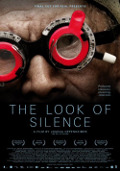
Directed by
Joshua Oppenheimer
90 minutes
Rated M
Reviewed by
Bernard Hemingway

The Look Of Silence
Synopsis: A documentary following the brother of a man murdered during the mass killings of “Communists” in Indonesia in 1965 who identifies and confronts his sibling's killer.
Joshua Oppenheimer‘s sequel to his remarkable 2012 documentary, The Act of Killing, to some extent follows the familiar rule of diminishing returns but it is still a film that will leave you wrung out by the cruelty of the human species.
In the original film, Oppenheimer invited some of the perpetrators of a military-backed, anti-Communist purge in Indonesia in the mid-1960s to reenact their murderous deeds which they did with, what appeared to our Western eyes as part grotesque levity, part self-preserving rationalization.
The Look Of Silence returns to the same events but this time focuses on one individual, Adi, a travelling optometrist, whose brother, Ramli, was hacked to death by the self-appointed executioners. Once again, the perpetrators re-enact the killing with the same mixture of affable good-humour and complete denial of any moral responsibility. The closest that they come to regret is a begrudging assertion that even if Ramli was probably a nice guy, he shouldn’t have been a Communist. The term “Communist” of course, means nothing or no more than “you’re next”.
From a Western perspective, the attitude of the killers is bizarre (not the least their revelation that they drank their victims’ blood as an antidote to madness) – imagine America’s HUAC committee ordering the mass slaughter of Commie sympathizers or the defendants at Nuremberg cracking wise about exterminating Jews. You simply can’t do it. On one level it would seem that these people are frighteningly stupid but the primary enabler and defence for their actions is a virulent, government-instilled (fed, it would seem, by machinations from Cold War-era America) hatred of Communists. And as the same people who perpetrated the killings are still in power, unlike the HUAC or the Nazis, the hateful ideology is still alive and well. From this perspective the killers, see themselves as heroic defenders of the State.
This time around Oppenheimer takes a more conventional approach to his topic with Adi acting as a kind of alter ego for us as he meets the killers. Amazingly, although determined to get to the bottom of things he is remarkably gentle in his confrontations, asking them to reflect on their deeds more than excoriating them for what they did. Only when he talks to his uncle who was a prison guard who effectively sent his nephew to his death, which he justifies with the infamous “ I was only doing my job” defence, does Adi’s forgiving nature seem tested (his mother is much more vehement in condemning her brother).
Oppenheimer mixes the main theme with scenes of Adi‘s family – his decrepit father and his aged but feisty mother, his wife and daughter - as well as focusing on Adi’s face as he watches a television monitor on which the killer’s describe how they murdered his brother and many others. This immediately familiar material help us in some mesure to mollify the bizarreness of what we are being shown, telling us that it is not about the Indonesian people as such but what happens when thuggery becomes the law of the land.

Want more about this film?


Want something different?




